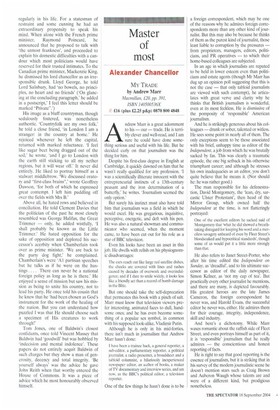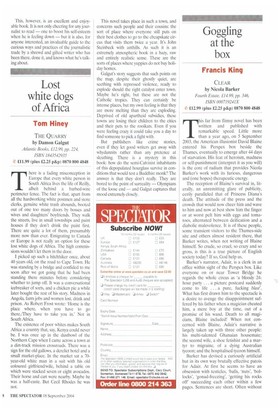Master of most
Alexander Chancellor
MY TRADE by Andrew Marr Macmillan, £20, pp. 391, ISBN 140500536X © £16 (plus 12.25 p&p) 0870 800 4848 Andrew Mart is a great adornment to his — our — trade. He is terribly clever and well-read, and I am sure he could have done something serious and useful with his life. But he decided early on that journalism was the thing for him.
Despite his first-class degree in English at Cambridge, it quickly dawned on him that he wasn't really qualified for any profession. 'I was a scientifically illiterate innocent with the entrepreneurial instincts of a 13th-century peasant and the iron determination of a butterfly,' he writes. 'Journalism seemed the only option.'
But surely his instinct must also have told him that journalism was a field in which he would excel. He was gregarious, inquisitive, perceptive, energetic, and deft with his pen. He was also a natural showman and communicator who seemed, when the moment came, to have been cut out for his role as a star of BBC television.
Even his looks have been an asset in this job. He dwells with relish on his physiognomic disadvantages:
The ears reach out like large red satellite dishes, the cheeks are covered with lines and rashes caused by decades of overwork and overindulgence; and if I dare to smile widely, it looks less like a friendly act than a record of bomb damage in the Blitz.
But one should take the self-deprecation that permeates this book with a pinch of salt. Man must know that television viewers prefer interesting, animated faces to dull, handsome ones; and he has even become something of a popular sex symbol, in common with his supposed look-alike, Vladimir Putin.
Although he is only in his mid-forties, there isn't much in journalism that Andrew Mart hasn't done:
I have been a trainee hack, a general reporter, a sub-editor, a parliamentary reporter, a political journalist, a radio presenter, a broadsheet and a tabloid columnist, a hilariously inexperienced newspaper editor, an author of books, a maker of TV documentary and interview series, and am now, as the BBC's political editor, a television reporter.
One of the few things he hasn't done is to be a foreign correspondent, which may be one of the reasons why he admires foreign correspondents more than any other kind of journalist. But this may also be because he thinks of them as the purest kind of journalist, those least liable to corruption by the pressures — from proprietors, managers, editors, politicians, and PR operatives — to which their home-based colleagues are subjected.
In an age in which journalists are reputed to be held in lower esteem even than politicians and estate agents (though Mr Man has dug up an opinion poll suggesting that this is not the case — that only tabloid journalists are viewed with such contempt), he articulates with great verve and clarity why he thinks that British journalism is wonderful, even at its most feckless. He is dismissive of the pomposity of 'responsible' American journalism.
And he is strikingly generous about his colleagues— drunk or sober, talented or witless. He sees some point in nearly all of them. The only exceptions seem to be those associated with his brief, unhappy time as editor of the Independent, a job from which he was brutally sacked by fax. This was clearly a traumatic episode, the one big setback in his otherwise triumphant career; and although he stresses his own inadequacies as an editor, you don't quite believe that he means it. (Nor should he: he was rather good.) The man responsible for his defenestration, David Montgomery, the 'lean, dry, sarcastic Ulster Protestant', then head of the Mirror Group, which owned half the Independent at the time, is not flatteringly portrayed:
One of the excellent editors he sacked said of Montgomery that 'what he did showed a breathtaking disregard for keeping his word and a merciless savagery unheard of even by Fleet Street's bloodsoaked and hypocritical standards', though some of us would put it a little more strongly than that.
He also refers to Janet Street-Porter, who after his time edited the Independent on Sunday, as 'dreadful', and to his ultimate successor as editor of the daily newspaper, Simon Kelner, as 'not my cup of tea'. But practically every other journalist he mentions, and there are many, is depicted favourably. His greatest heroes are the late James Cameron, the foreign correspondent he never was, and Harold Evans, the successful editor he never was, either. He admires them for their courage, integrity, independence, skill and industry.
And here's a dichotomy. While Man waxes romantic about the raffish side of Fleet Street, and even portrays himself as part of it, it is 'responsible' journalism that he really admires — the conscientious and honest reporting of facts.
He is right to say that good reporting is the essence of journalism, but it is striking that in his survey of the modern journalistic scene he doesn't mention stars such as Craig Brown and Auberon Waugh whose talents are and were of a different kind, but prodigious nonetheless. This, however, is an excellent and enjoyable book. It is not only cheering for any journalist to read — one to boost his self-esteem when he is feeling down — but it is also, for anyone interested, an invaluable guide to the curious ways and practices of the journalistic trade by a shrewd and gifted writer who has been there, done it, and knows what he's talking about.



















































































 Previous page
Previous page